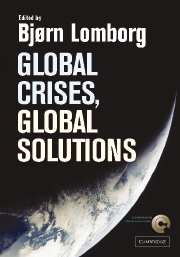Introduction
Published online by Cambridge University Press: 22 September 2009
Summary
The Focus for the Consensus
At its heart, the focus for the Copenhagen Consensus was very simple – it was to address the current global crises and come up with a list of the best solutions. The core idea is simple: with scarce resources to tackle the problems of the world, prioritization is necessary. Not being willing to prioritize does not make the problem go away: it simply becomes less clear – and, most likely, more expensive to solve in the end. The result is that our ability to do good is less than it could have been. Thus, very simply we need to know what we should do first. The practical aim of the Copenhagen Consensus was an attempt to present the best information available from economic studies as a ranked list of the very best projects to do in the world.
Why was This the First Explicit Economic Prioritisation?
Surprisingly such an explicit economic prioritization has not been done earlier. There are several reasons for this.
Hard-to-Compare Alternatives
First, it involves comparing very different and hard-to-compare alternatives, such as tackling malaria by distributing insecticide-treated mosquito nets (ITNs) and dealing with civil wars by deploying peace-keeping forces. Yet, such trade-offs happen implicitly all the time through (lack of) actual investments by countries and international agencies. In reality, prioritizing between such disparate issues on the international level is little different from the decision to spend money on hospitals rather than opera houses in a national prioritization debate.
- Type
- Chapter
- Information
- Global Crises, Global Solutions , pp. 1 - 10Publisher: Cambridge University PressPrint publication year: 2004
- 2
- Cited by



